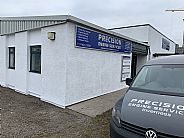Turbocharger Fault Finding
A turbocharger is not an independent device unlike other ancillary components on a vehicle, such as a power steering pump for example. It is an intrinsic part of the vehicle's power system. It shares with the engine its oil supply, water supply, air intake supply, exhaust gas flow, engine management control, various pneumatic devices, ignition and fuel injection devices. Any or all of these have a crucial effect on the operation of the turbocharger. The culmination of these variables can result in a relatively complicated task in accurate turbocharger fault diagnosis. It is for this reason that sufficient time and understanding must be applied to turbocharger fault investigations.
Other causes such as overboosting, overspeeding and foreign object impact damage are all common turbocharger failure causes. Any fault that will prejudice the operation of the turbocharger must be found and rectified before fitment of another turbocharger is carried out. When a turbocharger has failed the fault diagnosis does not stop there. Far more important is the reason for failure. All turbochargers fail for a reason and the most popular cause of failure are oil related problems.
Back to top ^




